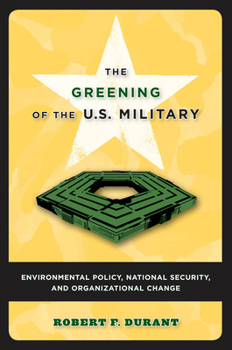The Greening of the U.S. Military: Environmental Policy, National Security, and Organizational Change
(Part of the Public Management and Change Series)
Select Format
Select Condition 
Book Overview
Durant explores the epic and ongoing struggle in the post-Cold War period to build a corporate sense of responsibility within the U.S. military for ensuring that its day-to-day operations promote national security without compromising public health, safety, and the environment. As the Cold War drew to a close in the George H.W. Bush administration, U.S. military bases harbored nearly 20,000 toxic waste sites, covering nearly 27 million acres of contaminated property. Then-Secretary of Defense Richard Cheney launched an initiative to incorporate good environmental actions into the daily business of defense. Durant's chronicle of the struggle between the military and environmental proponents--which drew in members of Congress, the presidency, state governments, environmental interest groups, and affected citizens--reveals how difficult instilling a resistant military with a green ethic has proved to be. Durant analyzes the dynamics of the efforts to hold the military accountable to environmental and natural resources laws in such matters as base cleanups, pollution prevention, natural resources management, and chemical weapons demilitarization. He scrutinizes the patterns of politics and strategies used by the key players and develops a framework for studying large-scale organizational change in the public sector. This rich story draws implications for intergovernmental regulation, organizational change, national security, and environmental politics.
Format:Paperback
Language:English
ISBN:1589011538
ISBN13:9781589011533
Release Date:June 2007
Publisher:Georgetown University Press
Length:320 Pages
Weight:0.95 lbs.
Dimensions:0.7" x 6.6" x 9.0"
Grade Range:Postsecondary and higher
Customer Reviews
0 rating





